Introduction
Hey there, fellow rabbit lovers! Are you ready to dive into the wonderful world of apples and their undeniable allure for our furry friends? Let’s find out, can rabbits eat apples?
Before we embark on this adventure, we need to lay down some ground rules.
You see, rabbits have delicate digestive systems, and we must tread carefully to ensure their health and happiness.
In this article, we’ll uncover the best time of day to feed apples to your beloved bunny and explore the wondrous benefits these fruits offer. From breakfast delights to evening indulgences, we’ll guide you through each magical moment.
We’ll also debunk common myths, discuss potential allergies, and even introduce some exciting alternatives to keep your bunny’s taste buds entertained.
So, are you ready for an apple-filled adventure like no other? Grab your bunny, hop on board, and let’s embark on a journey of fruity discovery.
Let’s go!
**Do Not Give Any Food To Your Rabbit Without Consulting A Veterinarian, This Article Contains Conventional Wisdom Only.
**DO NOT FEED RABBITS APPLE SEEDS
Key Takeaways
- Feeding apples to rabbits can be a healthy and enjoyable addition to their diet.
- The best time to feed apples to rabbits is in the morning as part of their breakfast, during the afternoon as a refreshing snack, or in the evening as a relaxing treat before bedtime.
- It’s important to feed apples in moderation and consider portion sizes to prevent digestive issues and tooth decay.
- Apples should be washed thoroughly and seeds and cores should be removed before feeding them to rabbits.
- It’s important to monitor rabbits for any signs of allergies or adverse reactions to apples.
- It is safe for rabbits to eat cooked apples, but it’s important to consider the potential loss of nutrients and increased sugar content.
- Baby rabbits can eat apples starting at around three to four weeks old, but it’s important to introduce solid foods gradually and in small amounts.
- Apple seeds contain cyanide and should always be removed before feeding apples to rabbits.
- Adding apple chunks to hay can be a fun and enriching activity for rabbits, promoting mental stimulation and providing hydration.
- Rabbits can have apple peels, but it’s important to introduce them gradually and in moderation.
- Rabbits should have no more than 5% of their diet consisting of fruits, including apples.
- It’s important to monitor rabbits for any adverse reactions or digestive issues when feeding them apples.
- There are other rabbit-friendly fruits like bananas, berries, and watermelons that can also be included in their diet.
The Best Time of the Day to Feed Apples to Your Rabbit
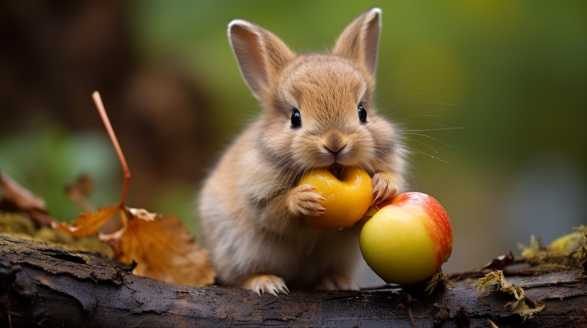
Have you ever wondered when is the best time to feed apples to your adorable furry friend? As a rabbit owner myself, I have done extensive research on this topic and experimented with different feeding schedules.
Understanding Rabbit Diet
Rabbits, being herbivores, have a delicate digestive system that requires a balanced diet of hay, fresh vegetables, and occasional fruit treats. Apples are one of the most popular fruits among rabbit owners due to their sweetness and nutritional value.
When it comes to feeding fruits like apples to your rabbit, it’s crucial to consider the timing and frequency to ensure optimal health and enjoyment for your fluffy companion.
Morning Delights: Apples as a Breakfast Treat
1. Breakfast: An Apple a Day Keeps the Boredom Away
Rabbits are most active during the early morning hours, and their energy levels are at their peak shortly after waking up. This makes mornings an excellent time to introduce an apple treat to your bunny.
Providing your rabbit with a small slice of apple as part of their breakfast will not only add some variety to their diet but also keep them entertained and mentally stimulated. Imagine starting your day with a delicious treat – wouldn’t that make you feel energized and excited?
Afternoon Snack: A Refreshing Bite
2. Afternoon: A Tasty Break to Boost Their Spirits
As the day progresses and your bunny hops around, taking a moment to offer a refreshing apple snack during the afternoon can be a great way to break up their routine and provide some hydration. Remember, rabbits require plenty of water to stay healthy, and apples consist of approximately 86% water, making them an ideal treat to include in their daily diet.
Evening Delicacy: An Apple to Wind Down
3. Evening: A Relaxing Treat Before Bedtime
In the evening, rabbits tend to wind down and become more relaxed. This is an opportune time to give your furry friend a small slice of apple, allowing them to savor the natural sweetness and unwind after an active day.
Giving your rabbit an evening apple treat not only provides them with a delightful snack but also adds some emotional comfort and relaxation before bedtime. It can become a cherished routine that helps strengthen the bond between you and your little companion.
Moderation is Key: Remembering the Importance of Portion Control
While incorporating apples into your rabbit’s daily routine is an excellent way to keep them happy and satisfied, it’s essential to exercise caution and moderation.
Rabbits have sensitive digestive systems, and sudden overconsumption of apples can lead to gastrointestinal issues such as bloating, diarrhea, or tooth decay. It’s crucial to provide apples as a treat and not exceed a quarter of an apple slice per day for an average-sized rabbit.
Monitoring your rabbit’s behavior and consulting with a veterinarian will help you determine the appropriate portion size based on your furry friend’s specific needs and health conditions.
Variety is the Spice of Life: Exploring Other Rabbit-Friendly Fruits
While apples are undoubtedly a favorite among rabbits and owners alike, it’s always exciting to introduce new flavors and diversify your bunny’s diet with other rabbit-friendly fruits. Here are some fruits to consider incorporating into your rabbit’s diet:
1. Blueberries
Blueberries are packed with antioxidants and fiber, making them a nutritious and delicious addition to your rabbit’s diet. Remember to offer them in moderation due to their natural sugar content.
2. Strawberries
Rich in vitamin C, strawberries are a vibrant and refreshing fruit that rabbits enjoy. Offer small amounts to prevent upset tummies.
3. Papaya
Papaya contains enzymes that aid digestion and can be a great treat for rabbits who struggle with digestive issues. Ensure it is ripe and offer in small quantities.
4. Cranberries
Cranberries are a great source of Vitamin C and can help prevent urinary tract infections in rabbits. However, due to their acidity, offer them sparingly.
Summing It Up
Incorporating apples into your rabbit’s diet can be a rewarding and enjoyable experience for both you and your furry friend. Remember to offer apples in moderation and choose the best time of the day to ensure maximum enjoyment for your rabbit.
From a refreshing morning treat to a relaxing evening indulgence, apples can add variety and excitement to your bunny’s daily routine. Remember to monitor their portion sizes and consider adding other rabbit-friendly fruits for an even more delightful culinary experience.
By paying attention to your rabbit’s feeding schedule and providing them with the occasional apple treat, you’ll create joyful moments, strengthen your bond, and ensure your furry companion’s overall well-being. So, why wait?
Apple Allergies in Rabbits: Signs and Prevention
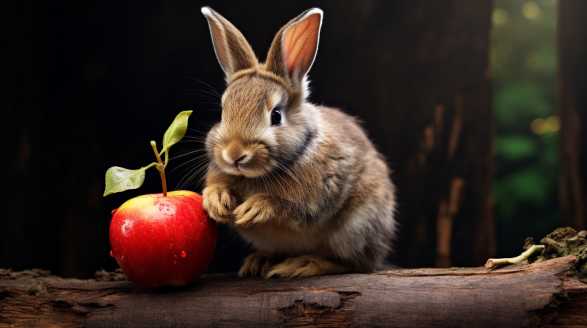
As a pet owner, it is crucial to understand the potential risks and allergies that your furry friends may face. Rabbits, cute and cuddly creatures, are no exception to this.
Yes, you heard it right – apples! we will look into the signs of apple allergies in rabbits, and provide some preventive measures to keep your bunnies healthy and happy.
Recognizing the Signs of Apple Allergies in Rabbits
Allergies can manifest in various ways in rabbits, and it’s essential to be alert and attentive to any unusual symptoms your rabbit may display after consuming apples. Here are some signs to watch out for:
- Digestive Issues:
- Diarrhea or Soft Stools: Loose and watery droppings can be an indicator that your rabbit is experiencing digestive distress due to an apple allergy.
- Lack of Appetite: If your rabbit suddenly loses interest in food and shows a decreased appetite, it could be a sign of an allergic reaction.
- Skin Irritations:
- Itching and Scratching: Rabbits with apple allergies may exhibit excessive scratching, leading to red and inflamed skin.
- Hair Loss: Allergic reactions to apples can sometimes result in fur loss or patches of thinning hair.
- Respiratory Problems:
- Sneezing and Coughing: If you notice your rabbit frequently sneezing or coughing after consuming apples, it could indicate an allergic response affecting their respiratory system.
- Nasal Discharge: Allergies may cause rabbits to have a runny nose or nasal discharge.
- Behavioral Changes:
- Restlessness: Allergies can make rabbits feel uncomfortable, leading to increased restlessness and a constant urge to move around.
- Lethargy: On the flip side, some rabbits may become lethargic and show a lack of energy as a result of their allergic reaction.
If you observe any of these signs in your bunny after feeding them apples, it’s crucial to take action promptly to mitigate their discomfort.
Preventing Apple Allergies in Rabbits
As the saying goes, prevention is better than cure, and this holds true for apple allergies in rabbits. Here are some preventive measures you can take to avoid triggering allergies in your furry companion:
Quality Control
- Choose Organic Apples: Select organic apples whenever possible, as they tend to have fewer pesticides and chemicals, reducing the risk of adverse reactions.
- Wash Thoroughly: Cleanse the apples under cold water, and even consider soaking them briefly to eliminate any potential residues that might aggravate your rabbit’s allergies.
Moderation
- Serve Apples Sparingly: Limit the quantity of apples in your rabbit’s diet to prevent overconsumption, which can increase the chances of allergies or digestive issues.
- Monitor Intake: Keep a close eye on how your rabbit reacts to even small amounts of apple, as each bunny can have varying sensitivities.
Alternatives
- Diversify the Diet: Rabbits need a well-balanced diet that includes a variety of fresh vegetables and high-quality hay. By giving your bunny a diverse diet, you reduce their reliance on apples as a sole food source, decreasing the risk of allergies.
- Introduce New Foods Gradually: If you decide to introduce new fruits or vegetables into your rabbit’s diet, do it slowly and in small amounts, observing any potential allergic reactions.
Consult Your Veterinarian
Remember, each rabbit is unique, and it’s crucial to consult your veterinarian before making any significant dietary changes or if you suspect your rabbit is experiencing an allergic reaction to apples or any other food.
Keeping your rabbit healthy and free from allergies is essential for their well-being. By understanding the signs of apple allergies and following preventive measures, you can ensure your fluffy friend leads a happy, allergy-free life.
Can Rabbits Eat Cooked Apples: Pros and Cons
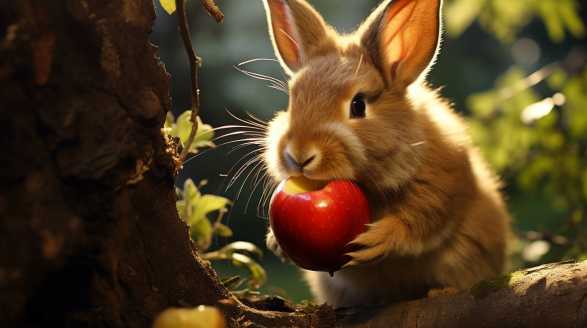
As a rabbit owner, I understand the importance of providing a nutritious diet for my fluffy friend. Rabbits are herbivores, and it’s essential to ensure they have a balanced diet that includes a variety of fruits and vegetables.
But can rabbits eat cooked apples? Let’s explore the pros and cons of feeding cooked apples to our furry companions.
Pros of feeding cooked apples to rabbits
Cooked apples can offer some benefits to your bunny’s diet. Here are a few reasons why you might consider adding them to their meals:
- Variety of nutrients: Apples are filled with essential vitamins and minerals such as vitamin C, vitamin A, and potassium. By introducing cooked apples to your rabbit’s diet, you provide a different set of nutrients that can contribute to their overall health.
- Enhanced flavor: Cooking apples can help enhance their natural sweetness and flavor, making them more appealing to your rabbit. This can be particularly useful if your bunny is a picky eater or needs some encouragement to try new foods.
- Soft texture: Cooked apples tend to have a softer texture compared to raw ones. This can be advantageous for rabbits with dental issues or older rabbits who may struggle to chew harder foods. The softness of cooked apples makes them easier to consume and digest.
- Digestive health: The high fiber content found in apples can be beneficial for a rabbit’s digestive system. Fiber helps regulate bowel movements and prevents issues such as constipation. Cooked apples retain a good amount of fiber, ensuring your rabbit’s digestive health is maintained.
Cons of feeding cooked apples to rabbits
While cooked apples offer some benefits, there are also a few drawbacks to consider before adding them to your rabbit’s diet:
- Loss of nutrients: Cooking apples can cause some loss of vital nutrients. Heat and prolonged cooking times can reduce the levels of vitamins and minerals in the fruit. If your goal is to provide your rabbit with maximum nutritional value, feeding raw apples may be a better option.
- Increased sugar content: Cooking apples can intensify their sweetness, which means the sugar content may be higher than that of raw apples. Too much sugar can lead to an upset stomach, weight gain, or other health issues in rabbits. It’s crucial to moderate the quantity of cooked apples given to your bunny to avoid any adverse effects.
- Potential choking hazard: Although the soft texture of cooked apples can be advantageous, it can also present a choking hazard for rabbits if not properly prepared. Larger chunks or pieces that are too firm may be difficult for your rabbit to swallow. Always ensure you cut the cooked apples into small, bite-sized portions suitable for your bunny’s size and chewing ability.
How to safely feed cooked apples to your rabbit
If you decide to introduce cooked apples into your rabbit’s diet, it’s essential to follow these guidelines to ensure their safety and well-being:
- Choose organic apples: Opt for organic apples to minimize the risk of pesticide exposure. Rabbits are sensitive to chemicals, so it’s best to provide them with the cleanest and most natural options.
- Peel and seed the apples: Remove the skin and seeds before cooking the apples. The skin may be difficult to digest for some rabbits, and the seeds contain small amounts of cyanide, which can be harmful in high quantities.
- Steam or bake apples: Steaming or baking apples is a healthier cooking method compared to frying or deep-frying, as it retains more nutrients. Avoid adding any seasonings or oils during the cooking process.
- Let them cool: Allow the cooked apples to cool down completely before serving to your rabbit. High temperatures can cause burns or mouth injuries. Make sure the apples are at room temperature to prevent any discomfort.
- Monitor your rabbit’s response: Introduce cooked apples gradually into your rabbit’s diet and observe how they react. Some rabbits may have sensitive stomachs or allergies to certain foods. If you notice any signs of digestive distress, such as diarrhea or loss of appetite, discontinue feeding cooked apples and consult with a veterinarian.
So can rabbits eat cooked apples? The answer is yes, with caution.
However, it’s crucial to consider the pros and cons discussed above and take the necessary precautions to ensure your rabbit’s safety and well-being. Always remember that a balanced diet, including a variety of fruits and vegetables, is key to your bunny’s overall health.
Can Baby Rabbits Eat Apples: Age Considerations
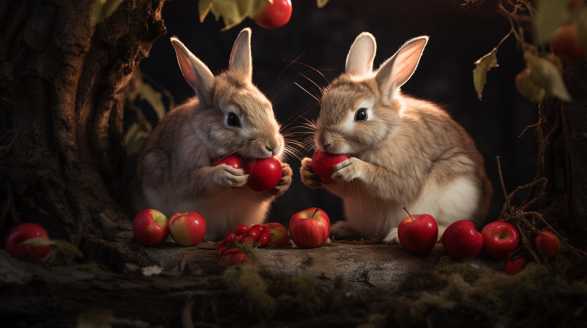
As a rabbit owner, I am always eager to explore different types of foods to keep my furry friend healthy and happy. One question that popped into my mind recently was, “Can baby rabbits eat apples?” I embarked on a fascinating research journey to uncover the truth behind this query.
The Curiosity Behind Baby Rabbits and Apples
Rabbits are naturally herbivores, feeding primarily on hay, fresh greens, and vegetables. However, as they grow and start exploring new foods, the question arises – can their diet include apples?
Baby Rabbit’s Digestive System
Before answering the question, let’s look into the digestive system of a baby rabbit. Newborn bunnies have a delicate and sensitive digestive system.
The transition from milk to a solid diet is a crucial phase in their growth.
Introducing Solid Foods to Baby Rabbits
Baby rabbits, also known as kits, begin nibbling on solid foods between two to three weeks of age. However, this period varies from one rabbit to another.
Apples: Nutritional Value
Apples are famous for their crunchy texture and rich nutritional profile. They are packed with vitamins, fiber, and antioxidants.
- Vitamin C
- Vitamin A
- Fiber
- Calcium
- Phosphorus
- Potassium
Age Considerations for Feeding Apples to Baby Rabbits
When it comes to feeding apples to baby rabbits, age plays a vital role. Let’s take a closer look at these considerations:
1. Two to Three Weeks Old
At this stage, baby rabbits are still heavily reliant on their mother’s milk. Their primary source of nutrition should be their mother’s milk until they are at least three weeks old.
It is always safest to stick to their natural diet during this stage.
2. Three to Four Weeks Old
Between three to four weeks old, baby rabbits begin to nibble on solid foods more frequently. This is an ideal time to start introducing small amounts of fruits and vegetables to their diet, including apples.
3. Apple Preparation and Serving
To ensure the health and safety of your baby rabbits, take the following steps when preparing apples:
- Wash the apple thoroughly to remove any dirt or pesticides.
- Remove the seeds and core, as these can be harmful to rabbits.
- Cut the apple into bite-sized pieces, considering the size of your baby rabbits.
When serving apples to your kits, start with small pieces and observe their reaction. If they show signs of discomfort or digestive issues, it may be best to delay introducing apples until they are a bit older.
Moderation is Key
While apples can be a tasty treat for baby rabbits, it is important to remember that moderation is key. Just like humans, rabbits should have a balanced diet to ensure optimum health.
It is crucial not to overfeed your baby rabbits with apples or any other sugary fruits, as it can lead to digestive problems and obesity.
Other Considerations for a Healthy Rabbit Diet
Aside from apples, there are several other factors to consider when providing a healthy diet for your baby rabbits. Here are a few additional considerations:
1. Fresh Water
Always make sure your baby rabbits have access to fresh, clean water. Hydration is crucial for their overall well-being.
2. High-quality Hay
Hay is an essential component of a rabbit’s diet, providing the necessary fiber to aid digestion and prevent dental issues. Choose good-quality hay and ensure it is always available for nibbling.
3. Fresh Greens and Vegetables
As your baby rabbits grow, gradually introduce a variety of fresh greens and vegetables into their diet. Examples include lettuce, spinach, carrots, and broccoli.
Consult a Veterinarian
While this article provides valuable insights into the age considerations for feeding apples to baby rabbits, every rabbit is unique. It is always essential to consult a qualified veterinarian for personalized advice tailored to your baby rabbits’ specific needs.
Remember, a healthy and happy rabbit is a result of a well-balanced diet, love, and proper care. So, go ahead and share a juicy apple treat with your baby rabbits, but always with caution and in moderation.
Can Rabbits Eat Apple Seeds: Myths vs. Facts
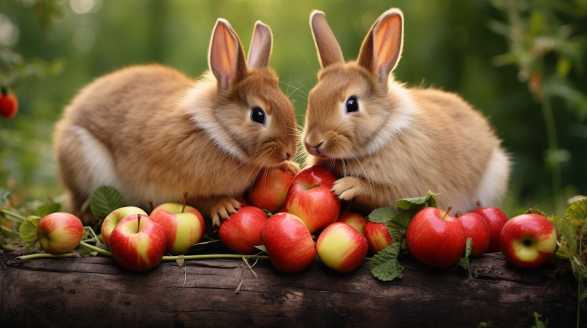
As a proud rabbit owner, I always strive to provide my furry friend with a well-balanced diet. Recently, I stumbled upon an intriguing debate about whether rabbits can eat apple seeds.
The Apple Seed Conundrum
We’ve all heard the saying, “An apple a day keeps the doctor away.” But what about the seeds?
Let’s explore the myths and facts surrounding the inclusion of apple seeds in a rabbit’s diet.
Myth 1: Apple Seeds Provide Essential Nutrients
One common misconception I came across was the belief that apple seeds are packed with nutrients beneficial for rabbits. While it’s true that apple seeds contain small amounts of Vitamin B17, a compound called amygdalin is found in higher concentrations.
Yikes! That’s definitely not something we want for our bunnies.
Myth 2: Rabbits Can Safely Digest Apple Seeds
Another popular belief suggests that rabbits have the ability to safely digest apple seeds due to their strong digestive systems. However, rabbits have delicate digestive systems and are primarily adapted for a diet rich in leafy greens and hay.
Fact 1: Cyanide Poisoning Risks
The truth is, apple seeds contain trace amounts of cyanide, which can be harmful to rabbits in excessive quantities. Even though a few apple seeds may not pose an immediate threat, it’s important to remember that rabbits weigh significantly less than humans.
Fact 2: Cyanide Poisoning Symptoms
Visibly, cyanide poisoning in rabbits can manifest through symptoms such as difficulty breathing, dilated pupils, vomiting, diarrhea, and in extreme cases, convulsions. If you suspect your rabbit has ingested apple seeds or any other potentially harmful substance, it’s crucial to seek immediate veterinary assistance.
Guidelines for a Safe Rabbit Diet
Now that we know the risks associated with apple seeds, it’s vital to establish a safe and balanced rabbit diet. Here are some guidelines to keep in mind:
- Hay, Hay, Hay! The foundation of a rabbit’s diet should consist of Timothy hay or other grass hays. Hay is essential for proper digestion and maintaining healthy teeth.
- Leafy Greens Galore! Introduce a variety of fresh, rabbit-safe leafy greens to provide essential nutrients. Some safe options include romaine lettuce, spinach, kale, and herbs like basil or cilantro.
- Moderate Pellet Portions: High-quality rabbit pellets can be included in moderation. Ensure the pellets contain a minimum amount of seeds, nuts, or dried fruits.
- Treats with Caution: Treats should be offered sparingly. Rabbits have a sweet tooth, but too many sugary treats can lead to obesity and digestive issues.
Alternatives to Apple Seeds
While apple seeds are a no-go for rabbits, there are plenty of safe and delicious alternatives to keep our furry friends entertained. Here are some rabbit-approved fruits and vegetables:
- Carrots
- Apples (without seeds)
- Blueberries
- Strawberries
- Raspberries
- Bell peppers
- Broccoli
Remember, only introduce new foods gradually to assess your rabbit’s reaction and prevent any digestive disturbances.
In the vast world of pet ownership, it’s crucial to separate the myths from the facts. When it comes to the question, “Can rabbits eat apple seeds?” it’s clear that the risks outweigh any potential benefits.
By following a safe and balanced diet, we can ensure our beloved rabbits lead long, healthy lives full of joy and mischief.
Adding Apple Chunks to Hay as an Enrichment Activity for Rabbits
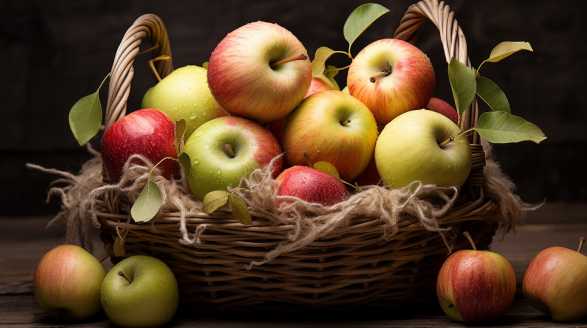
Hey there fellow bunny lovers! Today, I want to share with you a super fun and enriching activity that will surely make your furry friends hop with joy – adding apple chunks to hay!
And trust me, this activity ticks all the boxes. So, let’s dive right in and explore how adding apple chunks to hay can turn into an amazing enrichment experience for our beloved rabbits.
Why Enrichment Matters
Before we look into the details, let me quickly highlight why enrichment is vital for our fluffy companions. Rabbits, just like humans, have a need for mental stimulation and physical exercise.
That’s where enrichment steps in – it provides an outlet for their natural behaviors, promotes mental well-being, and keeps them physically active. So, let’s make their lives extraordinary by adding apple chunks to their hay!
Apple Chunks – Nature’s Sweet Gift
We all know how much bunnies love their treats, and apple chunks are no exception! These juicy, crunchy delights not only serve as a delicious snack but also offer a multitude of health benefits.
However, it’s crucial to remember that moderation is key. Too many apple chunks can upset their delicate digestive system, so be sure to offer them as an occasional treat.
Preparing the Enrichment Activity
Now that we understand the importance of enrichment and the goodness of apple chunks, let’s get into the nitty-gritty of setting up this delightful activity for our furry pals.
- Gather Your Supplies:
- Fresh apples (organic is best)
- A cutting board
- A sharp knife
- A small bowl or plate
- A handful of hay
- Love and excitement (essential!)
- Wash and Slice the Apples:
- Give your apples a good rinse under cold water to remove any dirt or pesticides. Remember, we want to keep it all-natural for our precious buns!
- Using a sharp knife, carefully slice the apples into small, bite-sized chunks. Make sure to remove the seeds and core, as they can be harmful to rabbits.
- Create a Hay Buffet:
- Select a clean, spacious area where your rabbits generally spend their time.
- Sprinkle a generous amount of fresh hay in that area, creating a fluffy, inviting space for your bunnies to explore.
- Introduce the Apple Chunks:
- Place the apple chunks on top of the hay in a scattered manner, creating an exciting treasure hunt for your rabbits.
- You can also hide a few apple chunks within the hay to challenge your bunnies’ foraging instincts and problem-solving skills.
Let the Enrichment Begin!
It’s showtime, folks – let the fun and excitement commence!
- Observe and Enjoy:
- Sit back and witness the sheer joy on your rabbits’ faces as they discover the tantalizing apple chunks amidst the hay. Their curious nature and inquisitive sniffs will light up your heart!
- Encourage Interactive Play:
- Gently encourage your rabbits to explore the hay and uncover the hidden treats. You can even use a favorite toy to make it even more interactive and stimulating for them.
- Playtime with Paw-sitivity:
- Get ready for adorable bunny antics! Watch as they dig, burrow, and nibble their way through the hay to uncover those precious apple chunks. It’s a sight to behold!
- Reward and Bond:
- Once your rabbits discover the apple chunks, reward them with praise, pets, and maybe even a few head rubs. This activity not only stimulates their minds but also strengthens the bond between you and your beloved companions.
Safety Tips and Considerations
As responsible rabbit parents, there are a few safety tips we must keep in mind during this enchanting activity:
- Supervision is Crucial:
- Always keep an eye on your rabbits while they’re engaging in this enrichment activity. This ensures their safety and allows you to intervene if any issues arise.
- Consistency is Key:
- Offer this activity in moderation – a couple of times a week is perfect. Regular variety is necessary to avoid habituation and keep your bunnies excited.
- Remove Unused Apple Chunks:
- If your rabbits don’t finish all the apple chunks within a few hours, remove them to prevent them from drying out or becoming unappetizing.
- Health Check:
- Pay attention to your rabbits’ overall health and digestion after enjoying this treat. If you notice any adverse effects, such as diarrhea or decreased appetite, consult your veterinarian.
Adding apple chunks to hay as an enrichment activity for rabbits is an utter delight for both pets and owners alike. Not only does it provide a captivating sensory experience for our beloved buns, but it also contributes to their overall well-being.
Grab some fresh apples, scatter those chunks, and watch your rabbits’ eyes sparkle with sheer excitement. Prepare yourself for a marvelous journey into the whimsical world of apple-enriched hay – your bunnies will thank you!
Are There Any Risks of Feeding Apples to Rabbits?
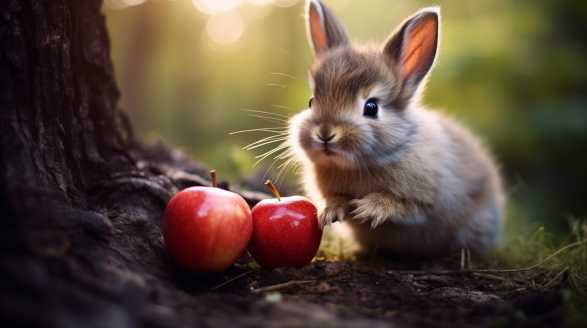
As a bunny owner, I’m always on the lookout for foods that are safe to feed my furry friend. One common question that often pops up in rabbit forums and communities is whether feeding apples to rabbits poses any risks.
The Nutritional Value of Apples
Before we dive into the potential risks, let’s explore the burst of nutrition apples bring to the table. Apples are not only tasty but also contain some essential nutrients your rabbit could benefit from.
- Fiber: Apples pack a good amount of fiber, which assists with gut health and keeps your rabbit’s digestion on track.
- Vitamins: A variety of vitamins, including vitamin A, vitamin C, and some B vitamins, are present in apples. These vitamins are crucial for your rabbit’s overall well-being and immune system.
- Minerals: Apples also offer minerals like potassium, which are necessary for healthy bodily functions.
Potential Risks of Feeding Apples to Rabbits
While there are undoubtedly nutritional benefits to feeding apples to rabbits, it’s important to understand that like any food, there are risks involved when overconsumed. Here’s a perplexing breakdown of the potential risks:
1. High sugar content
Apples contain natural sugars, primarily fructose. Although rabbits can handle a small amount of sugar in their diet, excessive sugar intake may lead to digestive issues, obesity, and even tooth decay.
2. Seeds and cores
When feeding apples to your rabbit, remove the seeds and core first. Apple seeds contain a small amount of amygdalin, a compound that can release cyanide when ingested in large quantities.
How to Feed Apples to Your Rabbit Safely
Now that we’ve uncovered the potential risks, let’s explore how you can incorporate apples into your rabbit’s diet without compromising their health. Follow these bursty tips to ensure safe apple consumption:
1. Fresh is best
Offer your rabbit fresh apples as an occasional treat. Avoid rotten or moldy apples, as they can cause gastrointestinal issues.
2. Moderation is key
Aim to limit apple treats to a few small pieces per week. This will help manage your rabbit’s sugar intake and prevent potential health problems.
3. Wash and peel
Before offering apples to your rabbit, ensure they are thoroughly washed to remove any dirt or pesticides. Additionally, consider peeling the apple to minimize the pesticide exposure for your furry friend.
4. Seedless delight
As mentioned earlier, remove the seeds and core before feeding apples to your rabbit. While a few seeds are unlikely to cause harm, it’s better to be safe than sorry.
Other Rabbit-Friendly Treats
While apples can be a delicious treat, it’s important to provide a varied diet to your rabbit. Here are some enticing alternatives to consider:
- Leafy greens: Rabbits adore fresh vegetables like kale, spinach, and romaine lettuce. These leafy greens are low in calories and high in essential nutrients.
- Herbs: Offer your rabbit a burst of flavor with herbs like basil, cilantro, or parsley. Not only are they tasty, but they also provide additional nutrients to support your bunny’s well-being.
- Berries: Raspberries, strawberries, and blueberries can make delightful treats for rabbits. Be sure to offer them in moderation due to their sugar content.
In the great apple debate for rabbits, the answer is perplexing yet simple: Yes, you can feed your rabbit apples, but it should be done in moderation and with care. While apples offer nutritional value, their sugar content and potentially toxic seeds require cautious feeding.
Remember, a healthy and balanced diet is vital for the overall well-being of your furry friend. So, mix up their treats with other rabbit-friendly options, and always consult your veterinarian if you have any specific concerns about your rabbit’s diet.
*Note: The information provided in this article is for educational purposes only and does not substitute professional veterinary advice.
The Health Benefits of Apples for Rabbits

As a proud rabbit owner, I always strive to provide my furry friend with the best possible care, which includes a well-balanced diet. While many people are aware that rabbits thrive on hay, vegetables, and pellets, they might not realize that fruits can also be a beneficial addition.
I will explore the health benefits of apples for rabbits and why they should be included in their diet.
An Apple a Day Keeps the Vet Away
1. Nutritional Value
Apples are an excellent source of essential nutrients for rabbits, providing them with vitamins, minerals, and dietary fiber. These nutrients are crucial for maintaining optimal health and preventing various illnesses.
- Vitamin A: Essential for good eyesight and a healthy immune system.
- Vitamin C: Boosts the immune system and aids in collagen production.
- B Vitamins: Contributes to energy production and a healthy nervous system.
- Fiber: Promotes gut health and prevents digestive issues.
- Antioxidants: Helps combat free radicals and reduce the risk of chronic diseases.
2. Dental Health
Rabbits have continuously growing teeth, and it’s important to ensure their teeth are properly worn down to prevent dental problems. Apples can provide a crunchy and enjoyable chewing experience for rabbits, which helps promote good dental health.
3. Hydration
Maintaining proper hydration is crucial for a rabbit’s overall well-being. While rabbits should always have access to fresh water, incorporating apples into their diet can also contribute to their hydration.
4. Weight Management
Obesity is a common health issue among domesticated rabbits, leading to a variety of health problems. Fortunately, apples are a low-calorie and low-fat fruit, making them an excellent addition to a rabbit’s diet for weight management.
Incorporating apples into your rabbit’s diet can be a wonderful way to provide them with additional nutrients while keeping them entertained. With their impressive nutritional profile and dental health benefits, apples are a fantastic fruit for rabbits.
By taking care of their diet, you can ensure your rabbit remains happy, healthy, and hopping with joy!
Can Rabbits Have Apple Peels: What You Need to Know
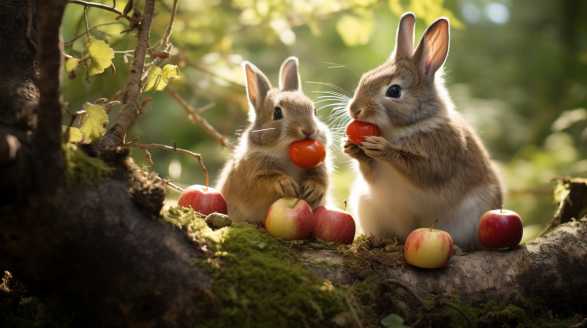
As a pet rabbit owner, there’s nothing more delightful than seeing your little furry friend munching on a fresh, healthy treat. And who can resist that sweet and tangy aroma of an apple?
The answer may surprise you!
Yes, they can!
Rabbits can indeed have apple peels, and they can be a healthy addition to their diet when given in moderation. However, there are a few things you should know before you go ahead and feed your fluffy companion an apple peel frenzy.
The Importance of Appropriate Portions
While it’s tempting to let your bunny go wild on apple peels, it’s crucial to remember that rabbits have sensitive digestive systems. Introducing any new food should always be done gradually and in small portions.
Benefits of Apple Peels for Rabbits
1. Nutritional Value
Apple peels contain essential vitamins and minerals that can contribute to your rabbit’s overall health. These include Vitamin C, Vitamin A, and dietary fiber, all of which can aid in digestion and boost their immune system.
2. Hydration
Rabbits are notorious for their aversion to drinking water, which puts them at risk of dehydration. Apple peels have a high water content and can provide a natural source of hydration for your bunny.
3. Chewing and Dental Health
Chewing on apple peels can be a great exercise for your rabbit’s teeth. The fibers in the peels act as a natural toothbrush, helping to wear down their continuously growing teeth and promoting good dental hygiene.
Potential Risks and Precautions
While apple peels can be a healthy addition to your rabbit’s diet, there are a few things to keep in mind to ensure their well-being.
1. Pesticides
When feeding apple peels to your rabbit, it’s essential to choose organic apples to reduce the risk of pesticide ingestion. Non-organic apples may contain harmful chemicals that can be detrimental to your furry friend’s health.
2. Allergies
Some rabbits may be allergic to apples or certain components found in apple peels. If you notice any signs of allergy such as diarrhea, excessive gas, or a change in behavior, it’s best to discontinue feeding them apple peels and consult a veterinarian.
3. Moderation is Key
While apple peels offer nutritional benefits, they should only be given as an occasional treat. Too much of any food can upset your rabbit’s delicate digestive balance.
How to Safely Feed Apple Peels to Your Rabbit
Now that you know the benefits and precautions of feeding apple peels to your rabbit, it’s important to ensure you’re doing it the right way. Here’s a step-by-step guide:
- Choose organic apples to minimize the risk of pesticide exposure.
- Wash the apple thoroughly to remove any dirt or contaminants.
- Slice the apple into small, thin pieces, removing the core and seeds.
- Offer a small piece of the apple peel as a treat and observe your rabbit’s reaction.
- If your rabbit enjoys the apple peel and shows no signs of adverse effects, you can continue to offer it as an occasional treat.
Alternatives to Apple Peels
If you’re unsure about including apple peels in your rabbit’s diet or your rabbit doesn’t enjoy them, don’t worry! There are plenty of other fruits and vegetables that you can offer as healthy alternatives.
- Carrots
- Blueberries
- Strawberries
- Bananas (in moderation)
- Papaya
- Bell peppers
- Leafy greens (such as kale or romaine lettuce)
Remember to always introduce new foods gradually and monitor your rabbit’s reaction to ensure they tolerate them well.
Rabbits can have apple peels as a delicious and nutritious treat. Just be sure to introduce them gradually, ensure they are organic, and feed them in moderation.
So, the next time you’re enjoying a juicy apple, why not share a small slice with your bunny companion? They’ll love the sweet taste and reap the benefits of this delightful treat!
How Many Apples Should Rabbits Eat in a Day?
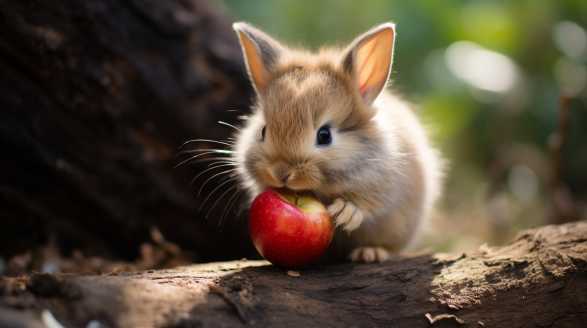
Hello there! Have you ever wondered how many apples rabbits should munch on each day?
I’ll dive into the fascinating world of rabbit nutrition and provide you with some helpful insights. So, let’s hop right in!
The Nutritional Value of Apples for Rabbits
Apples are not only a delicious treat for us humans but can also be a healthy and tasty snack for our furry friends. They are packed with essential vitamins and minerals that can contribute to a rabbit’s well-being.
- Fiber: Apples are a great source of dietary fiber, which is crucial for a rabbit’s digestive system. Fiber helps maintain healthy gut flora and aids in proper digestion.
- Vitamin C: This vitamin is essential for rabbits as they cannot produce it naturally. Apples provide a good amount of vitamin C, which helps boost their immune system and overall health.
- Antioxidants: Apples contain antioxidants that help fight off harmful free radicals in a rabbit’s body, reducing the risk of various diseases.
Now that we know how beneficial apples can be, let’s discuss the appropriate serving size for our bunny friends.
Finding the Right Balance: Appropriate Apple Consumption
While apples can be a healthy addition to a rabbit’s diet, it’s important not to go overboard. Too many apples can lead to digestive issues and obesity in rabbits.
Here are some guidelines to consider:
- Size Matters: The size of your rabbit plays a significant role in determining the appropriate serving size of apples. Smaller rabbits should consume less, while larger ones can handle a bit more.
- The 5% Rule: As a general rule, fruits (including apples) should constitute no more than 5% of a rabbit’s daily diet. The remaining 95% should consist of fresh hay, leafy greens, and high-quality pellets.
- Introduce Gradually: If your rabbit is new to apples, start with a small, thin slice to see how they react. Monitor their digestion and observe any signs of discomfort. Gradually increase the amount if all goes well.
- Avoid Seeds & Core: Make sure to remove the apple seeds and core before feeding them to your rabbit. These parts can be a choking hazard and may contain traces of cyanide, which is toxic to rabbits.
- Controlled Portions: Aim for a maximum of 1-2 tablespoons of sliced apples per day for an average-sized rabbit. This ensures they receive the nutritional benefits without risking any negative effects.
Signs to Watch Out For
While rabbits generally enjoy apples and tolerate them well, some individuals may have sensitivities or allergies. Pay attention to any adverse reactions and adjust their diet accordingly.
- Upset Stomach: If your rabbit experiences diarrhea or soft stools after consuming apples, it may be a sign that they are not tolerating the fruit well.
- Lethargy or Reduced Appetite: If your bunny suddenly seems less energetic or refuses to eat their regular food after consuming apples, it’s worth monitoring them closely for any other signs of discomfort.
- Allergic Reactions: In rare cases, rabbits can develop allergies to apples. Look out for symptoms such as swelling, itching, or difficulty breathing. If any of these occur, consult your veterinarian immediately.
Remember, each rabbit is unique, and their dietary needs may vary. It’s always a good idea to consult with a veterinarian before making significant changes to your rabbit’s diet or introducing new foods.
Other Rabbit-Friendly Fruits
While we’ve focused on apples in this article, it’s worthwhile to explore other rabbit-friendly fruits. Diversifying their diet can provide added nutrients and keep things interesting.
- Bananas: High in potassium and fiber, bananas are a favorite among rabbits. It’s best to feed them small pieces occasionally due to their higher sugar content.
- Berries: Strawberries, raspberries, and blueberries can be a delightful treat for rabbits. These fruits are low in calories and packed with antioxidants.
- Pineapples: This tropical fruit can be given to rabbits in small quantities. Pineapples are a good source of vitamin C and provide a tasty twist.
- Watermelons: Perfect for hot summer days, watermelons can help keep rabbits hydrated. Remove the seeds and rind before offering a small amount to your furry friend.
There you have it! Apples can be a delightful and nutritious addition to a rabbit’s diet when given in moderation.
And let’s not forget to keep things exciting by introducing other rabbit-friendly fruits into their diet.
Always prioritize your rabbit’s well-being and consult with a veterinarian for personalized advice. Here’s to happy and healthy bunnies munching on their delicious apple slices!
Conclusion
Wow, what a adventure we’ve been on! We’ve explored the best time of day to feed apples to our bunnies, debunked myths about apple allergies, and even learned how to safely introduce cooked apples into their diet.
We delved into the age considerations for feeding baby rabbits apples and uncovered the truth about those pesky apple seeds.
Throughout our journey, we discovered that apples can bring joy and nourishment to our furry friends. From the crisp morning treat to the relaxing evening indulgence, apples have become an integral part of our rabbits’ daily routine.
But above all, we recognized the significance of keeping a close eye on our rabbits’ health and well-being. We learned to observe any signs of allergies or adverse reactions and to consult with a veterinarian whenever in doubt.
So, my fellow rabbit enthusiasts, I hope you’re as excited as I am about feeding apples to our hopping companions. The crunch, the sweetness, the joy on their faces – it’s all worth it!
As we conclude our fruity adventure, let’s celebrate the wonders of apples and the happiness they bring to our beloved rabbits. Whether it’s a refreshing morning treat, a relaxing evening snack, or a delightful enrichment activity, apples have become a staple in our rabbits’ lives.
Safe travels, my fellow rabbit enthusiasts, and may your apple-filled adventures continue to bring love, joy, and endless bunny hops into your lives. Happy munching!
Frequently Asked Questions
Can rabbits eat apples?
Answer: Yes, rabbits can eat apples in moderation. Apples make a healthy and tasty treat for rabbits.
Are all parts of the apple safe for rabbits?
Answer: No, not all parts of the apple are safe for rabbits. The skin and flesh of the apple are safe and can be fed to rabbits, but the seeds and core should be removed as they can be toxic to rabbits.
How should apples be given to rabbits?
Answer: Apples should be washed thoroughly to remove any pesticides or dirt. Remove the seeds and core, then cut the apple into small, bite-sized pieces to avoid choking hazards.
How often can I feed my rabbit apples?
Answer: Apples should be given to rabbits as an occasional treat rather than a staple food in their diet. It is recommended to limit apple consumption to a few small pieces per week to prevent digestive issues or weight gain.
Can apples be given to baby rabbits?
Answer: It is not advisable to feed baby rabbits apples until they are at least 12 weeks old. Their digestive systems are still developing, and introducing new foods too early can lead to digestive problems.
Are there any risks or side effects of feeding apples to rabbits?
Answer: While apples are generally safe for rabbits, overfeeding them can cause digestive issues like diarrhea or bloating. It is crucial to feed apples in moderation and monitor your rabbit’s reaction.
Can rabbits eat other types of fruit?
Answer: Yes, rabbits can consume a variety of fruits, including berries, melons, and pears. However, it is important to introduce new fruits gradually and only in moderation to prevent digestive problems. Always research each specific fruit to ensure it is safe for rabbits before feeding.
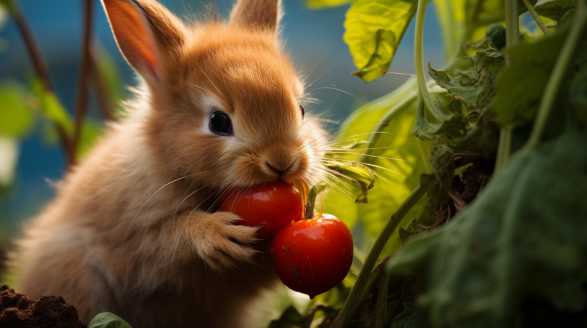
Can Rabbits Eat Tomatoes
Introduction Hey there, fellow rabbit enthusiasts! Are you ready to embark on a tantalizing journey through the world of rabbits and tomatoes? Let’s find out, can rabbits eat tomatoes? Now, I don’t know about you, but I simply adore rabbits. There’s just something about their twitching noses, wiggling tails, and those adorable little hops that […]
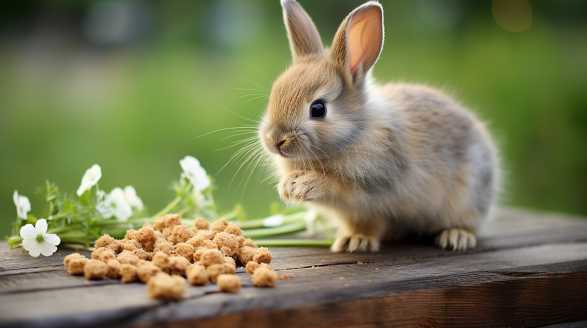
Can Rabbits Eat Alfalfa Pellets
Introduction Hey there, rabbit lovers! Are you looking for the best way to keep your furry friends happy and healthy? we’re diving into the wonderful world of alfalfa pellets and how they can benefit your beloved rabbits. As a long-time rabbit owner and enthusiast, I understand the importance of providing the right nutrition for our […]
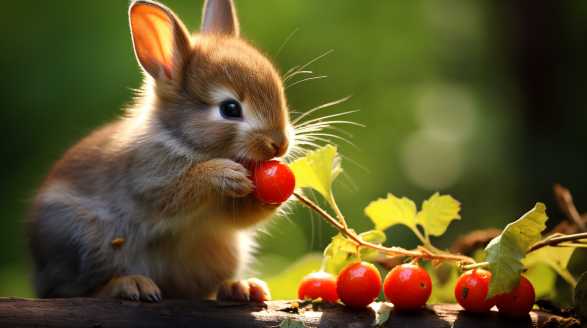
Can Rabbits Eat Cherry Tomatoes
Introduction Hey there, fellow rabbit enthusiasts! If you’re anything like me, you’re constantly thinking about how to provide the best care and nutrition for your furry friends. That’s where cherry tomatoes come in! These little bursts of flavor are not only delicious but also packed with nutrients that can benefit your rabbit’s health. That’s what […]
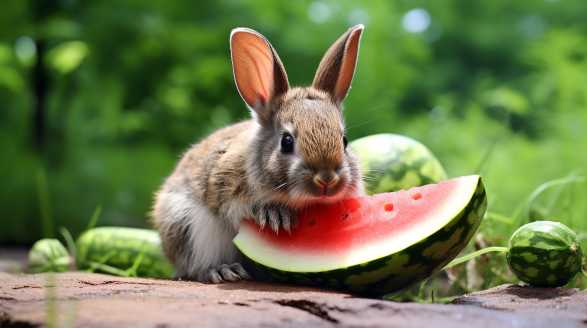
Can Rabbits Eat Watermelon
Introduction Hey there, fellow rabbit lovers! Have you ever wondered if your adorable little fluffball can indulge in the deliciousness of watermelon? Let’s find out, can rabbits eat watermelon? Watermelon can be a refreshing and hydrating treat, packed with essential vitamins and minerals for your bunny’s overall health and vitality. From promoting hydration to providing […]

Can Rabbits Eat Daylilies
Introduction Hey there, fellow gardeners and rabbit lovers! Are you a fan of daylilies like me? But here’s the catch – rabbits seem to have a bit too much love for these beautiful flowers. As a passionate gardener, I’ve had my fair share of battles with those adorable yet mischievous creatures in an attempt to […]

Do Rabbits Eat Phlox
Introduction Do rabbits eat phlox? Let’s find out. Picture this: a lush meadow filled with vibrant phlox flowers swaying in the gentle breeze. And who’s frolicking in this floral paradise? But here’s the part – these rabbits aren’t just enjoying a feast, they’re playing a crucial role in the survival of the phlox plants themselves! […]
